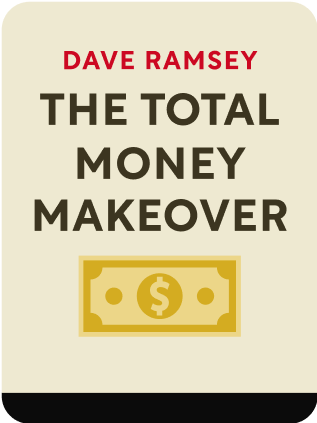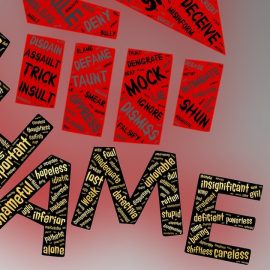

This article is an excerpt from the Shortform book guide to "The Total Money Makeover" by Dave Ramsey. Shortform has the world's best summaries and analyses of books you should be reading.
Like this article? Sign up for a free trial here .
What is the Dave Ramsey method? How does the Dave Ramsey method bust myths about money?
The Dave Ramsey method, or the Total Money Makeover, focuses on using effort and sacrifice for financial health. It requires first confronting money myths.
Read on for the myths about money you have to overcome as part of the Dave Ramsey method.
Dave Ramsey Method: Confront Money Myths
Like myths about debt, there are myths about getting and handling money. They run counter to the Dave Ramsey method and Total Money Makeover principle of effort and sacrifice, of living differently from everyone else now so you can live differently from everyone else in the future. Becoming financially fit has a cost and there aren’t any shortcuts.
Money myths stem from two basic mindsets:
1) Ignoring risks: People who are poor at managing money often ignore the risks of deals that seem attractive on the surface, or they ignore risks of failing to act when they should. There are several reasons:
- They may ignore risks out of laziness—they don’t want to put in the effort of investigating “great deals” for a downside—it’s easier to just believe the seller or lender—or they do so out of greed.
- They’re overwhelmed and just settle for a bad solution.
Regardless of the reason, those who deny a so-called deal’s risks end up disillusioned and worse off financially.
2) Looking for shortcuts: People facing money challenges often look for a shortcut or an easy solution, whether it’s winning the lottery or falling for a TV offer to make quick money or fix debt problems. But shortcuts, like microwave dinners or instant coffee, produce disappointing results.
These two mindsets help fuel the following myths:
Ignoring Risks
Myth #1: Things will work out if you don’t plan for retirement.
No one’s going to come to your aid in your old age. You especially shouldn’t expect the government, with its poor record of managing money, to effectively manage Social Security and Medicare. You need to plan and invest in your own future, starting now (a later chapter will explain how).
Myth #2: Gold is a good investment, especially in an economic crisis.
Gold has long been promoted by advertisements and TV advisors as a secure investment that won’t lose value in a bad economy.
But its track record over time is mediocre. Going back to Napoleon’s era, gold has shown average gains of only about 2% a year. In the last 55 years, gains have averaged 4.4%, comparable to inflation and savings accounts. In contrast, you could get a 12% return over time with a growth-stock mutual fund. Gold has done well since 2001 due to predictions of doom about 9/11 and the 2008-09 recession—but that’s been its only spike in history.
As for gold being valuable in an economic crisis, history shows that people turn in such instances to trading useful items and skills, not buying with gold nuggets or coins.
Myth #4: Cash value life insurance or whole life insurance are good ways to save.
Cash value policies (including whole life, universal life, and various combinations) constitute more than two-thirds of the life insurance policies being sold today. This is unfortunate because these policies, which combine insurance with saving and supposedly grow in value, are terrible investments.
They generate extremely low returns; while sellers have charts showing a growth trend, the policies seldom deliver as promised. For the first three years, the bulk of your monthly payment goes to commissions and expenses rather than to savings. After that, typical returns are: whole life—2.6%, universal life—4.2%, and variable life (including mutual funds)—7.4%. As noted before, you can do much better investing in growth-stock mutual funds.
Further, when you die, your family receives just the face value of the policy—not the savings you eventually accumulated.
Myth #5: Prepaying your funeral or your children’s college tuition protects against inflation.
There are better ways to save for both.
While it’s smart to plan your funeral in advance, instead of prepaying the expense it’s better to invest the amount in a mutual fund with a 12% average return. If you invest $3,500 at age 38, it would be worth $368,500 at age 78. Investing in a mutual fund is also a better way to save for college.
Myth #6: Buying a mobile home is better than renting because it’s an investment.
In truth, mobile homes are a poor investment because they quickly lose value. For example, if you buy a mobile home for $25,000, in five years you’ll still owe $22,000 on it, but it will be worth only $8,000. For comparison, if you put $25,000 into a mutual fund and it dropped in value to $8,000 in five years, that would be a terrible investment. The same is true for mobile homes.
No matter how many improvements you make, it will still be worth little, should you decide to sell it—rather than a step toward owning real estate that will increase in value, it’s an impediment. The best way to save for a home is to undergo a Total Money Makeover, while living in a cheap rental unit.
Myth #7: When you’re divorced, you’re not liable for loans your ex agreed in the divorce decree to pay.
Regardless of what the divorce decree says, you’re still liable if your name is on credit cards, car loans, or a mortgage, and your ex doesn’t make the payments. Your credit will be damaged too. You can tell the judge if your ex doesn’t pay, but you’re still liable for payment and can be sued by the lender. Even if your ex is regularly paying on a vehicle or home, you could still have difficulty getting a loan due to having too much debt on your record.
If you divorce, refinance all debts to exclude your name, or sell the items. If you don’t, you’re asking for trouble.
Looking for Shortcuts Is Not the Way in the Dave Ramsey Method
Myth #8: It can’t hurt to play the lottery—you never know, you might get rich.
If the lottery truly helped you build wealth, rich people would stand in line for it—but they aren’t the ones who line up for lottery tickets. The lottery is a government-run scam that taxes the poor—that’s why it’s most popular in the poorest ZIP codes.
Myth #9: Books and DVD sets touted on TV can tell you how to become wealthy by working only a few hours a week.
Anything that promises a huge return on a tiny investment is a scam. No one earns a six-figure income in a few hours a week. Don’t believe get-rich schemes in real estate, work-at-home jobs stuffing envelopes (machines do this much faster), or online medical billing courses.
Books and courses promising big incomes and investment “secrets” are deceptive, although they may sell better than money management books that preach what really works: hard work, living on a budget, and getting out of debt.
Myth #10: No one has time to plan a monthly budget, or make a retirement or estate plan.
Many people fail to plan because it’s human nature to focus on things that are urgent and put off thinking about the rest. You pay the electricity because your service will be cut off if you don’t; however, there’s no immediate result if you don’t draw up a budget or retirement plan.
Successfully managing money includes thinking about how you want to use it from now through the end of your life. Everyone needs to plan a monthly budget and save for retirement.
The only way to control your money is by creating a written plan allocating it. As motivational speaker John Maxwell noted, if you don’t have a budget directing where your money is to go, you’ll later wonder where it went.
Myth #11: Debt management companies advertising on TV can help you pay off your debts.
These companies may get you out of debt, but you’ll end up with ruined credit. Companies like Consumer Credit Services and AmeriDebt (which was forced by the government to shut down) get a single monthly payment from you and allocate it among your creditors after working out lower payments and interest with them. This differs from debt consolidation in that you’re not getting a loan. If you later try to get an FHA or VA loan, you’ll be treated like you filed a Chapter 13 bankruptcy and have ruined credit.
Further, in letting someone else fix your problems, you don’t learn and change your spending habits.
Myth #12: A credit repair service can “clean up” your credit, erasing past problems.
These services, or “kits” they sell, are mostly scams. You can only remove something from your credit record if it’s wrong; this requires writing a letter to the credit bureau requesting the error be removed.
These companies often tell you to contest all bad credit. But if you try to get something removed (by lying) so you can get a loan, you’re committing fraud. Some kits or services also advise you to get a new Social Security number—a second identity—so you can start a fresh credit report, but this is also fraud. Rather than lying to clean up your credit, pay cash instead of credit—and in seven years, bad credit will drop from your record.
Myth #13: It’s easy to file for bankruptcy and start over.
On the contrary, bankruptcy is painful—it’s one of the top five life-changing events, along with divorce, serious illness, disability, and loss of a loved one. It permanently damages your credit.
Chapter 7 bankruptcy remains on your record for 10 years and Chapter 13 for seven years. However, a bankruptcy will continue to follow you for a lifetime. Applications for loans and jobs may ask if you’ve ever filed for bankruptcy and if you lie, no matter how old the bankruptcy, it’s fraud.
Most bankruptcies can be avoided with a Total Money Makeover, which is painful, but less so than a bankruptcy. It’s better to fix your problems than suffer a bankruptcy, lawsuits, and foreclosure.
Myth #14: You can get away with skipping insurance.
Going without certain insurance is a risk no one should take. The types of insurance recommended as part of your Total Money Makeover are:
- Homeowner and auto: Save on premiums by going with higher deductibles.
- Life insurance: Get 20-year term life insurance equivalent to about 10 times your salary.
- Long-term disability insurance: You need it because you’re far more likely to become disabled than to die before age 65. Get coverage through your job for 50-70% of your income if you can.
- Health insurance: The No. 1 cause of bankruptcy is medical bills, so don’t go without health coverage. Lower your premium by choosing a larger deductible and use an HSA (Health Savings Account) to save money tax-free.
- Long-term care insurance: If you’re over 60, you should have long-term care insurance for in-home or nursing home care. The average cost of nursing home care is $40,000 a year (Shortform update: this cost is now about $90,000 a year).
Myth #15: It’s not important to have a will if you’re young.
Everyone should have a will. If, like 70% of Americans, you die without a will, your state will decide what to do with your assets. Get a will for your family’s sake: a will makes it much easier for your loved ones to manage your estate.
So, for the Dave Ramsey method, you have to push past these common myths.

———End of Preview———
Like what you just read? Read the rest of the world's best book summary and analysis of Dave Ramsey's "The Total Money Makeover" at Shortform .
Here's what you'll find in our full The Total Money Makeover summary :
- The 7 steps to achieving financial stability (you'll love #7)
- A fool-proof plan for becoming debt-free
- How myths about debt and money are crippling your financial health






